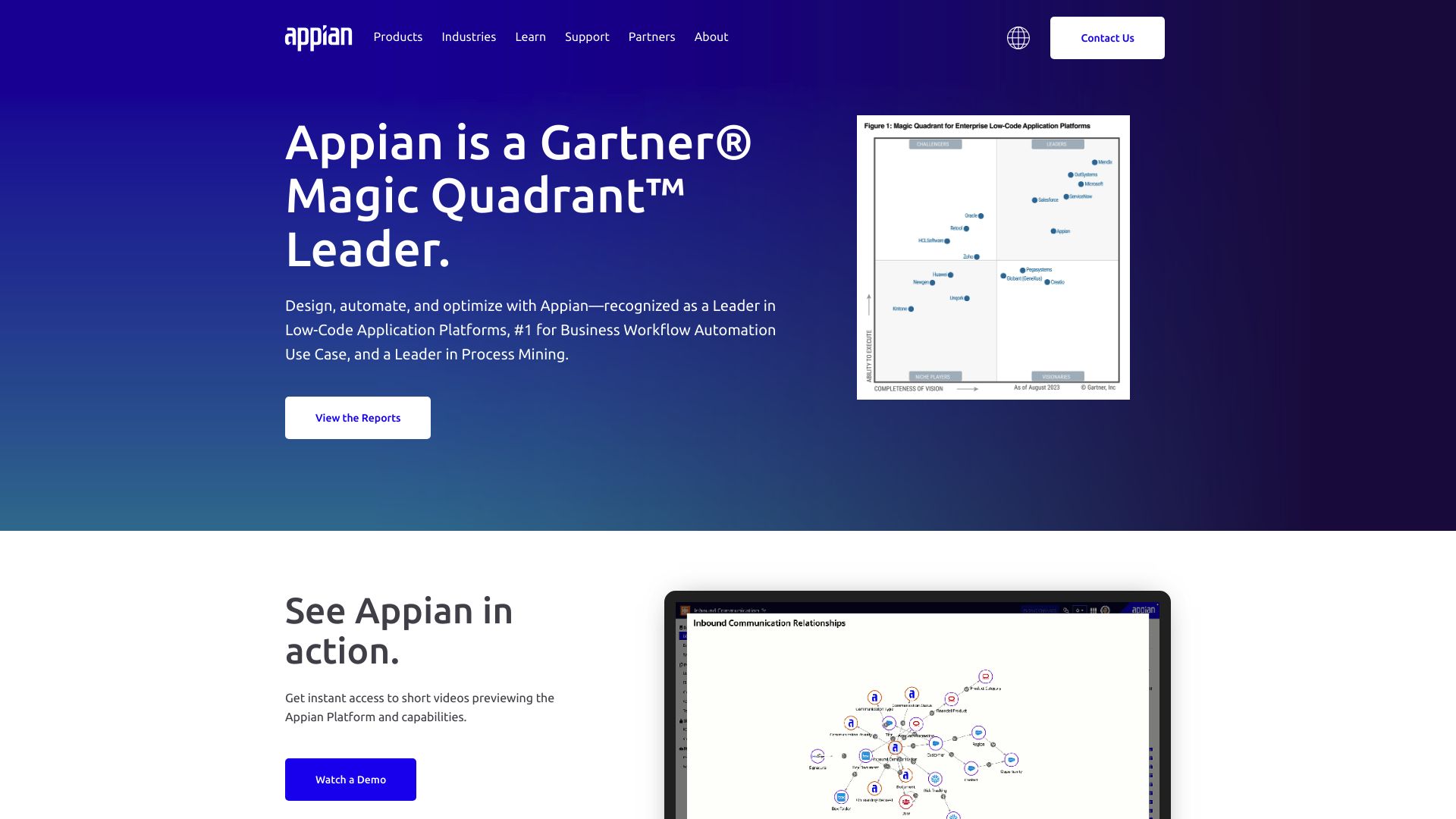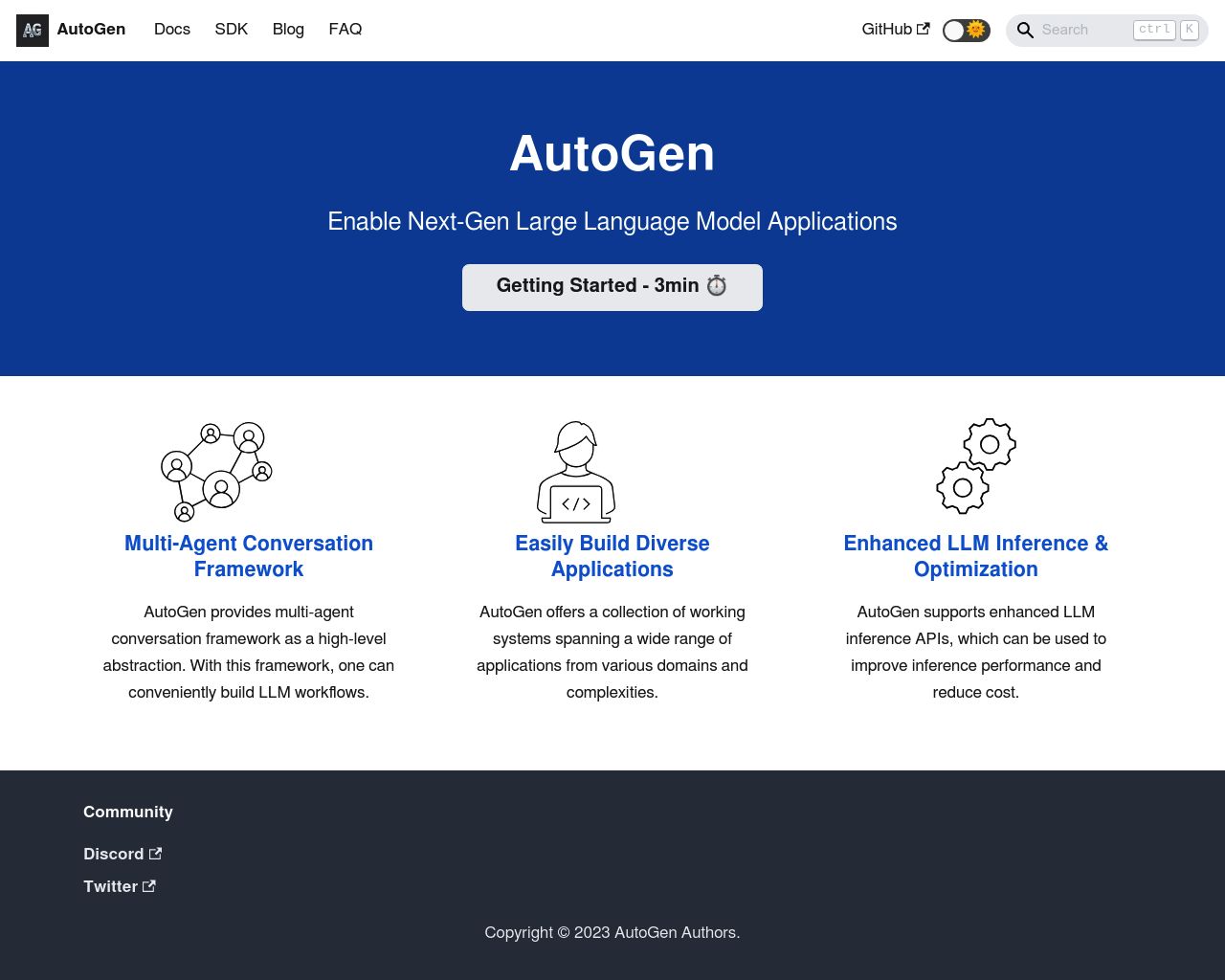Appian vs. AutoGen: AI Integration Compared
In the evolving landscape of artificial intelligence (AI) and process automation, businesses are constantly seeking the most efficient and effective platforms to integrate AI into their operations. Two prominent contenders in this space are Appian vs. AutoGen. AutoGen, developed by Microsoft, is renowned for its advanced multi-agent framework and capabilities in large language model (LLM) applications.
On the other hand, Appian is a leader in low-code process automation, recently enhanced with AI capabilities to streamline business workflows. This comprehensive comparison will delve into the core features, deployment options, and overall suitability of AutoGen and Appian for developers and businesses. By examining their strengths and limitations, we aim to help you determine which platform best meets your AI integration needs.
Appian Overview
Appian is a leading platform in the realm of low-code AI integration and business process automation. The platform stands out for its ability to make artificial intelligence accessible and flexible across various industries and applications.


appian’s core offering focuses on enhancing automation processes by seamlessly integrating AI capabilities into business workflows through a low-code design environment. This approach democratizes AI, making it accessible to non-specialists and enabling quick deployment of intelligent solutions. The platform provides a range of prebuilt AI capabilities, including document classification, data extraction, email classification, and generative AI skills such as prompt building and text summarization.
One of Appian’s key strengths lies in its commitment to data privacy and security. The platform ensures that AI models built and data used remain private and secure within the user’s control, a crucial feature for businesses concerned about data protection. Additionally, Appian offers integration with advanced AI services like OpenAI/ChatGPT, enhancing natural language processing capabilities for tasks such as email communication automation and document management.
The platform’s extensive automation tools support end-to-end process automation, combining AI with robust process management capabilities to improve efficiency and accuracy in business operations.
Features like the Enterprise Copilot allow users to get instant answers by creating knowledge sets with curated documents, facilitating quick and accurate information retrieval. However, while Appian excels in many areas, it may not offer some specialized features like multimodal AI capabilities or advanced debugging tools for AI skills, which could be limiting for certain use cases.
AutoGen Overview
AutoGen is an open-source framework designed for developing Large Language Model (LLM) applications using multi-agent conversations. It enables developers to create customizable and conversable agents that can interact with each other, LLMs, tools, and humans to solve various tasks.


AutoGen’s core feature is its ability to facilitate conversations between multiple agents. These agents can collectively perform tasks autonomously or with human feedback, making it highly adaptable for different use cases. The framework maximizes the performance of LLMs like ChatGPT and GPT-4 by offering enhanced inference capabilities, including tuning, caching, error handling, and templating.
AutoGen supports both fully autonomous agent operations and human-in-the-loop problem-solving. This flexibility is significant for applications where human input is essential. The framework has demonstrated effectiveness in a wide range of applications, from automated task solving and code generation to continual learning and complex problem-solving in group chats.
AutoGen offers useful debugging tools, including logging functionalities for API calls, which is essential for diagnosing and optimizing LLM-based systems.
It also includes EcoOptiGen, a cost-effective technique for tuning large language models, highlighting its focus on enhancing the efficiency and effectiveness of LLMs. However, AutoGen may require more technical expertise compared to some no-code platforms, potentially limiting its accessibility for non-technical users.
Feature Comparison
Appian and AutoGen offer distinct approaches to AI integration and development, with notable differences in their core components and security features. Appian focuses on low-code AI integration within business processes, providing prebuilt AI capabilities and emphasizing data privacy. It excels in document processing, email classification, and workflow automation. AutoGen, on the other hand, is an open-source framework designed for developing LLM applications using multi-agent conversations, offering more flexibility for developers to create customizable agents.
In terms of core components, Appian provides a low-code platform with visual builders and no-code options, making AI accessible to non-specialists. It offers robust process automation tools and integration with services like OpenAI/ChatGPT. AutoGen, while powerful, may require more technical expertise, as it focuses on enabling developers to create conversable agents that can interact with each other, LLMs, tools, and humans. AutoGen’s strength lies in its ability to facilitate autonomous multi-agent conversations and problem-solving capabilities.
Regarding security, Appian emphasizes data privacy and secure AI model development within the user’s control. AutoGen’s open-source nature may require additional security measures to be implemented by the user. While both platforms offer valuable AI integration capabilities, they cater to different user needs and technical requirements.
| Appian | AutoGen | SmythOS | |
|---|---|---|---|
| CORE FEATURES | |||
| Hosted Agents (Dev, Production) | ❌ | ❌ | ✅ |
| Environments (Dev, Production) | ✅ | ❌ | ✅ |
| Visual Builder | ✅ | ❌ | ✅ |
| No-Code Options | ✅ | ❌ | ✅ |
| Autonomous Agents | ❌ | ✅ | ✅ |
| Explainability & Transparency | ✅ | ❌ | ✅ |
| Multi-Agent Collaboration | ❌ | ✅ | ✅ |
| Work as Team | ✅ | ❌ | ✅ |
| Agent Work Scheduler | ❌ | ✅ | ✅ |
| SECURITY | |||
| Constrained Alignment | ✅ | ❌ | ✅ |
| Data Encryption | ✅ | ❌ | ✅ |
| OAuth | ✅ | ❌ | ✅ |
| IP Control | ✅ | ❌ | ✅ |
| COMPONENTS | |||
| Foundation AIs | ❌ | ✅ | ✅ |
| Huggingface AIs | ❌ | ❌ | ✅ |
| Zapier APIs | ❌ | ❌ | ✅ |
| All other APIs, RPA | ✅ | ❌ | ✅ |
| Classifiers | ✅ | ❌ | ✅ |
| Data Lakes | ✅ | ❌ | ✅ |
| DEPLOYMENT OPTIONS (EMBODIMENTS) | |||
| Deploy as API | ✅ | ❌ | ✅ |
| Deploy as Webhook | ✅ | ❌ | ✅ |
| Staging Domains | ✅ | ❌ | ✅ |
| Production Domains | ✅ | ❌ | ✅ |
| API Authentication (OAuth + Key) | ✅ | ❌ | ✅ |
| Deploy as Site Chat | ❌ | ❌ | ✅ |
| Deploy as Scheduled Agent | ❌ | ❌ | ✅ |
| Deploy as GPT | ❌ | ❌ | ✅ |
| Scalability | ✅ | ❌ | ✅ |
| DATA LAKE SUPPORT | |||
| Hosted Vector Database | ❌ | ❌ | ✅ |
| Sitemap Crawler | ❌ | ❌ | ✅ |
| YouTube Transcript Crawler | ❌ | ❌ | ✅ |
| URL Crawler | ❌ | ❌ | ✅ |
| PDF Support | ✅ | ❌ | ✅ |
| Word File Support | ✅ | ❌ | ✅ |
| TXT File Support | ✅ | ❌ | ✅ |
Best Alternative to Appian and AutoGen
SmythOS emerges as the superior alternative to Appian and AutoGen, offering a comprehensive and user-friendly platform for AI agent development and deployment. We provide a visual builder and no-code options, making AI accessible to users of all technical backgrounds. Our platform supports autonomous agents, multi-agent collaboration, and a wide range of deployment options, including APIs, webhooks, and scheduled agents.
We also provide extensive support for various AI models, APIs, and data sources, allowing for greater flexibility and customization.
Unlike Appian and AutoGen, SmythOS offers a complete suite of security features, including data encryption, OAuth, and IP control. We also provide extensive support for various AI models, APIs, and data sources, allowing for greater flexibility and customization. Our platform includes a hosted vector database and supports multiple file formats, enabling efficient data management and processing.
SmythOS stands out with its scalability and diverse deployment options, making it suitable for businesses of all sizes. We offer staging and production environments, API authentication, and the ability to deploy as a site chat or GPT. These features, combined with our intuitive interface and robust capabilities, make SmythOS the ideal choice for those seeking a powerful and versatile AI agent builder.
Conclusion
Appian and AutoGen offer distinct approaches to AI integration and development, each with its own strengths. Appian excels in low-code AI integration within business processes, providing prebuilt capabilities and emphasizing data privacy. AutoGen, as an open-source framework, offers flexibility for developers to create customizable agents for LLM applications using multi-agent conversations.
While both platforms have their merits, SmythOS emerges as the superior alternative, offering a comprehensive and user-friendly platform for AI agent development and deployment. We provide a visual builder and no-code options, making AI accessible to users of all technical backgrounds. Our platform supports autonomous agents, multi-agent collaboration, and a wide range of deployment options, including APIs, webhooks, and scheduled agents.
SmythOS stands out with its extensive security features, support for various AI models and data sources, and scalability options. We offer a hosted vector database, support multiple file formats, and provide staging and production environments. These features, combined with our intuitive interface and robust capabilities, make SmythOS the ideal choice for those seeking a powerful and versatile AI agent builder. To experience the full potential of AI integration and automation, create a free SmythOS account today and revolutionize your workflow with our cutting-edge platform.
Last updated:
Disclaimer: The information presented in this article is for general informational purposes only and is provided as is. While we strive to keep the content up-to-date and accurate, we make no representations or warranties of any kind, express or implied, about the completeness, accuracy, reliability, suitability, or availability of the information contained in this article.
Any reliance you place on such information is strictly at your own risk. We reserve the right to make additions, deletions, or modifications to the contents of this article at any time without prior notice.
In no event will we be liable for any loss or damage including without limitation, indirect or consequential loss or damage, or any loss or damage whatsoever arising from loss of data, profits, or any other loss not specified herein arising out of, or in connection with, the use of this article.
Despite our best efforts, this article may contain oversights, errors, or omissions. If you notice any inaccuracies or have concerns about the content, please report them through our content feedback form. Your input helps us maintain the quality and reliability of our information.
